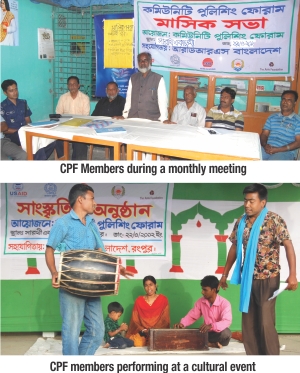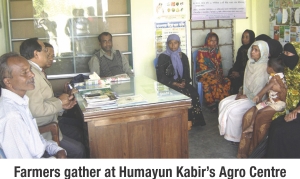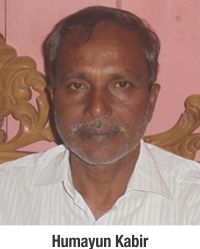Feature
Bogra
Community Police Forum
Community Police Forum (CPF) has stepped into its eighth year. Its effectiveness is noticeable by the public and admired by the officials. It has proved to be a great tool in preventing petty crime as well as social crimes. With the enthusiastic assistance from various NGOs, there are now 518 more CPFs and many trained police officers. It's a success story that has prompted to initiate many more projects all over northern parts of Bangladesh.
.................................................................................................
Hasibur Rahman Bilu
 With the combined effort of people from various walks of life, the pilot project of “Community Police Forum” (CPF) has been a success. Eight years ago, three northern districts of Bangladesh (including Bogra) saw the inception of the program. Now, the highly successful crime reducing program has been introduced to sixteen more northern districts of the country. To make the project even more effective, The Asia Foundation is conducting special training operation on 1,300 police officers of the Rajshahi and Ragpur divisions. With the combined effort of people from various walks of life, the pilot project of “Community Police Forum” (CPF) has been a success. Eight years ago, three northern districts of Bangladesh (including Bogra) saw the inception of the program. Now, the highly successful crime reducing program has been introduced to sixteen more northern districts of the country. To make the project even more effective, The Asia Foundation is conducting special training operation on 1,300 police officers of the Rajshahi and Ragpur divisions.
Focusing on reducing drug abuse and domestic violence, eight years ago a non-government organization called “Light House” initiated the pilot project in 2004 in Bogra forming only nine CPFs. The success of the project in Bogra led to more CPF projects on an Upazilla level by A.K.M. Shahidul Haque (additional IGP). This year, 518 CPFs and 1,300 trained police officers will work together against drug abuse, mugging, child marriage and many other important issues. The CPF project also includes discussions on public awareness and cultural events.
Rangpur's Additional Police Super Md. Rashidul Hasan said “The CPF program has resulted in a noticeable reduction in robbery and cattle theft in the Gangachara Upazilla.” He also added that the CPF members are now working against motorbike hijacking and stealing. Sub-Inspector Kabirul Islam of the same area said “our job has become much easier”– referring to CPF's relentless effort to promote awareness amongst the public against various crimes. Another non-government organization, “Rangpur Dinajpur Rural Service” is assisting the CPF project in Rangpur. Journalist and Rangpur CPF chairman Susanta Bhowmik informed that – Mohammad Ali Sarker, Mahtab Uddin, and Md. Haider Ali were so impressed by the effectiveness of the project, they have decided to donated land to setup CPF office in their union.
CPF has many success stories. For example, the presence of CPF has prevented many dowry cases. Momena form Pirgacha and Rabeya Khatun from Tampat upazillas have not only been saved from dowry but are also enjoying a happy married life. Gambling practice has completely stopped among students of the Jolpaitoli village in Dinajpur since the introduction of CPF in the area. Lipi Khatun of Hajra Dighi village has also been saved from child marriage.
Translated by Zia Nazmul Islam
Moulvibazar
Humayun Kabir's Agro Information Service
A unique initiative has been taken to provide 'Agricultural Information' to the farmers on their daily needs. Humayun Kabir of Buratola village under Kagabola Union of Moulvibazar sadar upazila has taken the effort to establish an 'Agriculture Information Centre’
.................................................................................................
Rajat Kanti Goswami
 Humayun Kabir is a commercial farmer. His main occupation is to produce and supply paddy seeds to the Bangladesh Agriculture Development Corporation (BADC). He mainly produces aromatic rice on his land and supplies the seeds of this paddy to the BADC. He has 25 bighas of land. Agriculture is the only source of income for him. 54 year old Humayun Kabir is the 2nd son of his parents (Shahana Karim and late Abdul Karim). He has 7 sisters and 2 brothers. He is father to 4 (2 sons and 2 daughters). His eldest son is studying at Sylhet Polytechnic Institute; his elder daughter is a HSC examinee from Moulvibazar Government College. Other two are primary school students. His wife Husne Ara Begum is a housewife. Humayun passed his SSC examinations from Moulvibazar government High School in 1973. Humayun Kabir is a commercial farmer. His main occupation is to produce and supply paddy seeds to the Bangladesh Agriculture Development Corporation (BADC). He mainly produces aromatic rice on his land and supplies the seeds of this paddy to the BADC. He has 25 bighas of land. Agriculture is the only source of income for him. 54 year old Humayun Kabir is the 2nd son of his parents (Shahana Karim and late Abdul Karim). He has 7 sisters and 2 brothers. He is father to 4 (2 sons and 2 daughters). His eldest son is studying at Sylhet Polytechnic Institute; his elder daughter is a HSC examinee from Moulvibazar Government College. Other two are primary school students. His wife Husne Ara Begum is a housewife. Humayun passed his SSC examinations from Moulvibazar government High School in 1973.
The Information Centre was established at a rented building at the Buratola village in February. He started commercial farming from 1992. When speaking to Star Insight, Humayun Kabir said that, at the preliminary stage, he had faced problems to cultivate his lands. He faced problems because he didn't know how and when to apply fertilizers and pesticides and how to diagnose diseased crops and what treatments to use. Then he contacted the officials of the Agricultural Extension Department (AED). The AED officers extended their support to him and gave him different leaflets and books on these issues.
Humayun also said, “A few years ago, I used to regularly visit a friend's pesticide shop in Moulvibazar. There I saw that, farmers came to the shop and asked about the problems of their crops to the shopkeeper, who gave them pesticides but neither the farmers nor shopkeeper had any specific idea on the problems.” He continued “the shopkeeper prescribed pesticides not knowing what the actual problem was, which was mainly because the farmers themselves didn't know what was wrong with their crops. It was because of this, I decided to do something for the ignorant farmers”.
On his 25 bighas of lan, Humayun Kabir has a Litchi garden with 165 litchi plants, a Jackfruit garden with 550 trees, a Guava garden with 500 trees and a herbal garden with 200 herbal trees like Arjun, Amloki, Hartaki, Neem etc. Humayun sells the herbs to the Kabiraj (village physicians of herbal medicine). He has also planted spices like Ada, Holud, Daru-chini, Tejpata, Long etc. He also has a cow farm with 13 cows.
Humayun said- “In our rural areas, farmers have been facing problem of diseased crops and system of cultivation. Many farmers don't have access to information – they don't know how to prepare the land and for which crop. Women farmers have been facing these much more because they cannot go to the agriculture officials”.
Now, an average of, 10 to 15 farmers contact Humayun Kabir every day to get suggestions and solutions on how to deal with their problems regarding crops. Many of the people are getting assistance over the phone. He opens his information centre from 8 am to 10 am and 1pm to 4pm every day to give advice to the farmers.
Motai Miah 45 of Kagabola village informed that he has created a fruit garden on his land. “I was inspired by Humayun Kabir. He is always giving us farmers necessary advice free of cost.” Arshod Ali 50 of the same village said “Even before opening an Information Centre he gave me advice on how to combat the diseases of my vegetables.” Sokil Miah 42 of Agiun village has a guava garden. At the initial stage, his fruits never bloomed from the buds due to a fungus attack. “Humayun Bhai gave me a remedy to this problem.”
Morful Begum 35 of Buratola village said “I cultivate and sell different vegetables from her lands. The vegetable plants, especially the potatoes and tomatoes are infected with diseases easily. According to Humayun's suggestion I started applying pesticides and fertilizers on my land. He always advised me to use organic pesticides and fertilizers. Only in a very few cases do I apply inorganic items, and since then I have been achieving a better yield.” Not only Motai Miah, Arshod Miah, Sokil Miah, and Morful Begum, but other farmers like Sao Bibi, Shadhin Miah and Golap Bibi have echoed the same tone on Humayun Kabir's service.
Humayun Kabir took part in different training programmes held in Moulvibazar, Sylhet, Bogra and Dhaka. Besides participating in the training, he has visited different areas at home and abroad. He has visited Jaintapur of Sylhet district to gather knowledge on 'Multa' (orange like fruit) cultivation, Comilla to see 'Baukul' cultivation, Sirajganj to see cow farming, Dinajpur to see aromatic rice production and Bogra to see paddy production system. Aside from that, he also travelled to Orissa of India to learn about goat farming and to Kolkata and Delhi to learn about flower cultivation.
 From the training and visits, he gained knowledge on agriculture and later was inspired to spread his knowledge to the local farmers. He has collected a huge number of books on agricultural farming. He also has leaflets on different diseases of crops and how to combat them. While giving advice, he follows these books and leaflets. Aside from these, he has good relations with the agriculture officers of Moulvibazar and they are always happy to give him advice. From the training and visits, he gained knowledge on agriculture and later was inspired to spread his knowledge to the local farmers. He has collected a huge number of books on agricultural farming. He also has leaflets on different diseases of crops and how to combat them. While giving advice, he follows these books and leaflets. Aside from these, he has good relations with the agriculture officers of Moulvibazar and they are always happy to give him advice.
He received a prize on a national level back in 2009 on fruit gardening and in 2010 he got 1st prize in the Moulvibazar district for tree plantation. On the inaugural day (February 13) of his information centre, information on the cultivation systems of different vegetables and crops, different ways of combating crop diseases, using of fertilizers and insecticides was presented to the gathering. Different posters containing information on crops are hanging in the walls of the information centre. These posters have depicted the solutions of problems including diseases of crops and vegetables.
Humayun Kabir wants to share his experience amongst the local farmers. He also stated that the main goal of his agriculture information centre is that it allows farmers to come here and get solutions to their problems regarding farming. If he knows the solution, he will provide it to them at once. If he has no idea about the narrated problem of farmer, he writes it down in a register book and seeks a solution by discussing the written problem with the agriculture officers.
Humayun Kabir has always had two hobbies. First of which is to cultivate the latest variety of paddy, which the DAE help him with. Secondly, the distribution of plants and of fruits bearing trees among the primary school children. Every year he distributes 100 plants to the students of the primary school of his union. His only dream is to establish 'Andhare Alo' a school for blind children. “When I have the financial capacity, I shall most definitely establish the school” – said Humayun.
Md Shahjada, the former Deputy Director of the Department of Agriculture Extension (DAE) of Moulvibazar said, “When I came to this area a few years back, I found that farmers were cultivating 'potatoes of the Bhulaginj variety' and paddy only. But now, the situation has changed; now the farmers of this area are cultivating different varieties of crops, vegetables and fruits.” He continued, “The times have changed and farmers of many areas of the country have been attracted to commercial cultivation. Easy communication network has changed the farmer's mentality.”
Kazi Lutful Bari, the upazila DAE officer of Moulvibazar sadar said, “The DAE has only a few Information Centres in some areas. But not all farmers are able to get there due to various reasons. Due to the limitation of wealth and manpower, DAE run agriculture Information Centres have not been established at every union of the district. On the other side, many farmers can't avail services due to the distance.”
Local farmers will be benefitted from Humayun's Agriculture Information Centre. He also added, “We help Humayun by providing service and advice. We also take him along with us to different training and field-observation programmes.”
Md. Nurul Islam, The Livestock Officer of Moulvibazar sadar has echoed the same, Abdul Zalil Miah, the Deputy Director (DD) of the DAE of Moulvibazar district told Star Insight that the DAE will provide whatever support they can to Humayun Kabir. He appreciated the activities of Humayun and said if more people come with such initiative, our country will turn into a real 'Sonar Bangla'. He also said, “Though the DAE officials are working at every union, however, the initiatives such as the one of Humayun Kabir will boost up the DAE service.” He continued, “Many DAE officials come from other areas, so language is a problem, making it difficult to communicate to the local farmers. In this case, local such as Humayun will reduce the gap between DAE officials and local Farmers.”
Copyright
(R) thedailystar.net 2012 |
